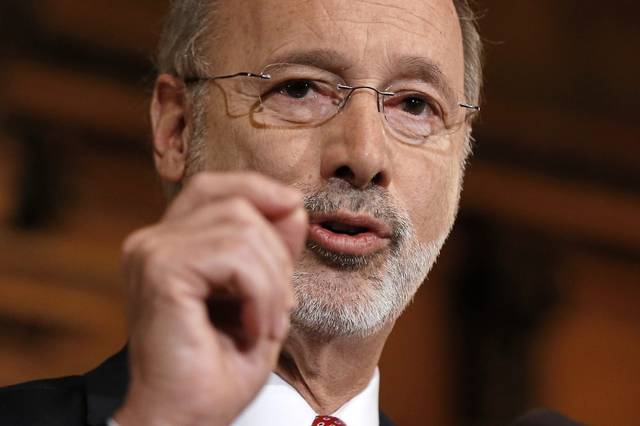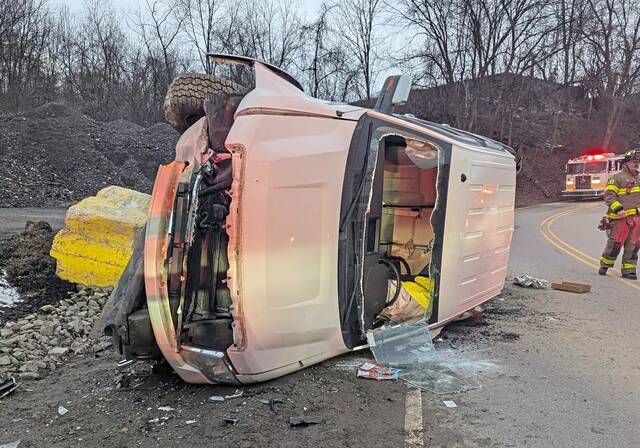State Rep. Daryl Metcalfe’s push to impeach Gov. Tom Wolf for imposing coronavirus-related restrictions that wreaked havoc on Pennsylvania’s economy is historically unprecedented, political experts said Wednesday.
It’s also unlikely to get the support needed for a gubernatorial impeachment to move forward, the experts said.
“These are outlandish claims, accusations,” said Joseph DiSarro, a political science professor at Washington & Jefferson College. “I doubt Gov. Wolf is losing sleep over this. There just is nothing there.”
Metcalfe said Tuesday after filing articles of impeachment against Wolf that the governor’s actions during the pandemic amounted to “unconstitutional dictates and Orwellian overreach into our lives and the marketplace.”
Metcalfe, a Republican from Cranberry, didn’t respond to requests for comment Wednesday.
Neither did Wolf, a Democrat from York County. In an attempt to slow the spread of the coronavirus, measures taken by Wolf during the pandemic have included ordering all non-life-sustaining businesses to close, issuing stay-at-home orders and closing schools.
“Because we took quick, decisive action, we never actually reached the sky-high rates that several other states have reached,” Wolf said during a news conference Wednesday.
Pennsylvania is one of only three states that has seen a steady decline in coronavirus cases for more than 42 days, according to Wolf.
Christopher Borick, a political science professor at Muhlenberg College, said trying to impeach the governor fits in with Metcalfe’s role as a provocateur.
“Like many things that Daryl Metcalfe does, it’s more about publicity than it is about tangible outcomes,” Borick said. “He looks for opportunities to raise his profile and engage in these types of battles.”
Metcalfe, a nine-term legislator, is a conservative known for pushing controversial measures including legislation requiring doctors to treat unvaccinated children. In 2018, he tweeted a response about Parkland, Fla., students calling for gun control after a deadly school shooting there that implied those speaking out weren’t genuine and instead part of a conspiracy.
Although impeachment is sometimes used as a rhetorical threat in Pennsylvania politics, this is the first time in contemporary history that articles of impeachment have been introduced against a governor, Borick said. Metcalfe’s legislation had 24 GOP co-sponsors.
Articles of impeachment can be approved by a simple majority vote of the state House, where Republicans hold a 109-93 edge over Democrats.
The GOP majority is slimmer in the state Senate, with 28 Republicans, 21 Democrats and one independent. A two-thirds vote, or one supported by at least 33 senators, is required for impeachment.
The last time impeachment of a Pennsylvania official was bandied about was four years ago, when it was considered against former Attorney General Kathleen Kane.
Kane ultimately resigned in 2016 after being convicted of perjury, obstruction and other counts for leaking grand jury material and lying about it. She was released from jail in July 2019.
Pennsylvania Supreme Court Justice Rolf Larsen of Pittsburgh was impeached in 1994 after being convicted of conspiring to obtain drugs using fraudulent prescriptions.
After a two-month trial in the state Senate, Larsen was convicted on one of the House’s seven articles of impeachment.
According to PennLive, Larsen’s case was the last in modern history.
In 1811, county Judge Thomas Cooper was impeached for injudicious conduct.
Another Pennsylvania judge, Nicholas More, was removed in 1685. He has the distinction of being both the first judge in the American colonies and the first provincial official in Pennsylvania to be impeached, according to PennLive.
“There’s always been somebody in the Legislature who started making noise. But it’s never gone anywhere in recent history,” DiSarro said. “When leaders point the double-barrel shotgun of impeachment or some other outlandish charges, they’re usually shooting blanks. The shotgun is not loaded here.”
DiSarro also decried what he termed the weaponizing of impeachment over politics instead of serious violations of the public trust or crimes that impeachment is intended to address.
“Impeachment was put into place to deal with serious matters of corruption,” DiSarro said.
Pursuing impeachment is something that should be done with extreme caution, Borick said.
“You should proceed lightly and use only in case of emergency,” he said.
Impeachments are rare at the state level across the country, according to Michael Coulter, a political science professor at Grove City College.
He uses the 1988 case of Arizona Gov. Evan Mecham in his classes and couldn’t recall any others in recent memory.
Mecham was successfully impeached on charges of obstruction of justice and misuse of government funds.
Mecham was the fifth governor in the U.S. to be convicted in an impeachment trial since the Civil War.
The last governor in an impeachment trial was Oklahoma’s Henry S. Johnson in 1929, according to the Arizona Daily Star.
Until 1970, Pennsylvania governors were limited to one term, which made going to the time and expense of impeachment highly unfeasible, Coulter said.
“There’s not a lot of examples or cases to think about what would be the standard used,” Coulter said.
The state constitution provides little guidance, except that impeachment of a governor or any other official is possible “for any misbehavior in office.”
“Judgment in such cases shall not extend further than removal from office and disqualification to hold any office of trust or profit under this Commonwealth,” the constitution says. “The person accused, whether convicted or acquitted, shall nevertheless be liable to indictment, trial, judgment and punishment according to law.”











